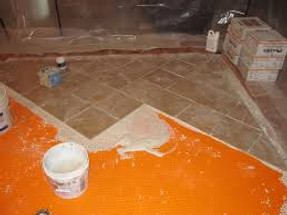Posted by Kara Jacobson, Gino DiGiallonardo, Jr. on Dec 5th 2017
Part 2 of 2 Part Series: Which Substrate is Best

In Part 1 of our 2 Part Series, here, we discussed some differences of opinion on two popular choices of cement board - Hardibacker vs Durock.
In this post, we will discuss the difference between using cement board (Hardibacker, Durock) and an uncoupling membrane as your floor substrate. Some of the more popular uncoupling membrane choices are Schluter's Ditra, Mapei's MapEGuard and Laticrete's Stratamat, but what are the differences in all these uncoupling membranes and cement board?
First off, an uncoupling membrane is waterproof. While tile is waterproof, water can still penetrate to the subfloor through unprotected or cracked grout joints, exposed edges near a bathtub, around a toilet or where the tile meets the wall. If water is able to penetrate through, it will eventually get into your subfloor. Uncoupling membranes provides an additional layer of protection against water. Cement board products are not waterproof. Water will penetrate the board, but the board will not deteriorate and it will prohibit mold build up. However, just because the board is protected, it will not protect the plywood subfloor underneath it.
In addition to protection from water, uncoupling membranes are much lighter than cement board. Therefore, you won't exhaust yourself hauling cement board all day. Membranes are easier to install, saving you time and labor, so the process goes much faster.
When cutting each product, you will find that cutting cement boards can me messy and dusty. Uncoupling membranes are cut with a utility knife, so they is no dust when cutting and it's easy to make odd shaped cuts in tight areas.
Finally, membranes accommodate for minor movement in a floor and prohibit crack in a subfloor from transferring through the tile making more reliable and less likely to crack. Cement boards will support the floor, but larger cracks will transfer through to the tile.
With all these benefits, you can expect that uncoupling membranes will sell for a premium. When using an uncoupling membrane, you can expect to add roughly .75¢ per square foot to your job, but your job will be completed faster, with greater protection and less labor. While cement boards are wonderful products, uncoupling membranes are superior products.

